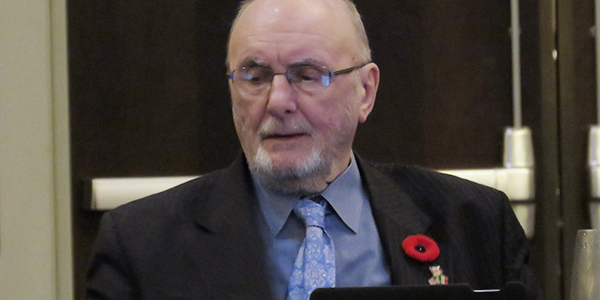By Holden Mann
“My favorite two words in the world [are] ‘cognitive blindness,’ which means we don’t know what we don’t know,” says David Goulding, who retired from NERC’s Board of Trustees this month after serving for nearly a decade. (See Former Con Ed Exec to Lead E-ISAC.) “And that has come to hit us many times along the way as NERC has developed.”
Recalling his more than 35 years associated with NERC, Goulding frequently returns to this theme of making the best of limited knowledge. Many of his efforts with the organization have been focused on driving home to stakeholders the importance of understanding their own limitations and accepting advice from others, and he believes this will continue to be one of the industry’s biggest challenges going forward.
Firsthand Experience

Goulding’s experience with the energy industry goes back to his native England. Although his family had no electricity for the first 10 years of his life, growing up next to a coal mine and near a generating station gave Goulding a keen understanding of the importance of energy to everyday life. After graduating from the University of Bradford, he joined the U.K.’s Central Electricity Generating Board, where he worked in transmission and generation construction, operations and maintenance for several years. This hands-on role gave him a unique perspective among many of his peers.
“Where I come from is a little different from most people you find in senior positions in this industry today,” Goulding says. “I come from the coalface, if you like — almost literally, since five generations in my family did work at the coalface.”
“At the coalface” is a British idiom, similar in meaning to “on the front line” or “in the trenches,” with the “coalface” being the part of the mine from which the coal is actually dug.
“So I look at everything from that perspective … and think to myself, ‘How does that work at the coalface? What do the people have to do in the generating stations … and the control rooms, in order to maintain reliability?’”
Continuing his climb in the industry, Goulding came to Canada in 1977 to take a role with Ontario Hydro. Through that position he first began attending meetings of NERC, which at the time was still struggling to define its role relative to federal authorities and industry operators. In those days, the board was entirely composed of industry stakeholders, and the organization was “an instrument of the regions,” as Goulding recalls, with little outside input into its standards and limited enforcement ability.
Stronger Role, Growing Threats
Expanding the authority of the board was a major interest of Goulding’s early involvement with NERC. Over the years, he and others pushed to revamp the regional coordinators’ delegation agreements with the national body to give NERC a greater role in information sharing and the ability to penalize noncompliance. A panel on which Goulding served in the 1990s led to key changes, including a requirement for nine independent board members to balance the 37 industry stakeholders and provide a much needed outside perspective.
“We really didn’t see some of the challenges that were coming down the line. We didn’t see that [the] industry itself was going to get fragmented, with some companies going bankrupt [and] some companies taking over others,” he says. “Our big challenge back then was to recognize that things … were going to change.”
Change continues to be a major theme for the industry. Since joining the NERC board in 2009, Goulding’s biggest concern has been the growing threat from cyberwarfare, which in recent years has seen sophisticated attacks emerge from state actors including Russia and Iran. (See Report: Oil, Gas Hackers Expanding to Grid.) He believes the threat will only grow as malicious actors find new ways around utilities’ defenses.
“It’s almost impossible to stay ahead of the threats. You’re almost chasing these people, because they come up with something different every day,” Goulding says. “Just at one station, they [may] get thousands of attacks in a month. Not in a year — a month. Trying to stay ahead of that in this business is a real challenge.”
Open Minds Essential
The cyber threat will remain a primary focus for NERC’s new Canadian trustee, but new challenges are bound to emerge that may be difficult to imagine today. No matter the background of his eventual replacement, Goulding says an ability to absorb the advice of others will be essential in responding to a changing landscape.
“[One] thing I’d say is very important … is: listen. Listen to the stakeholders; listen to the other board members,” Goulding says. “This is the most collegiate board I’ve ever worked on. … Everybody’s dedicated, [and] every new member coming along would be foolish if they didn’t take the opportunity to learn from those other board members.”




